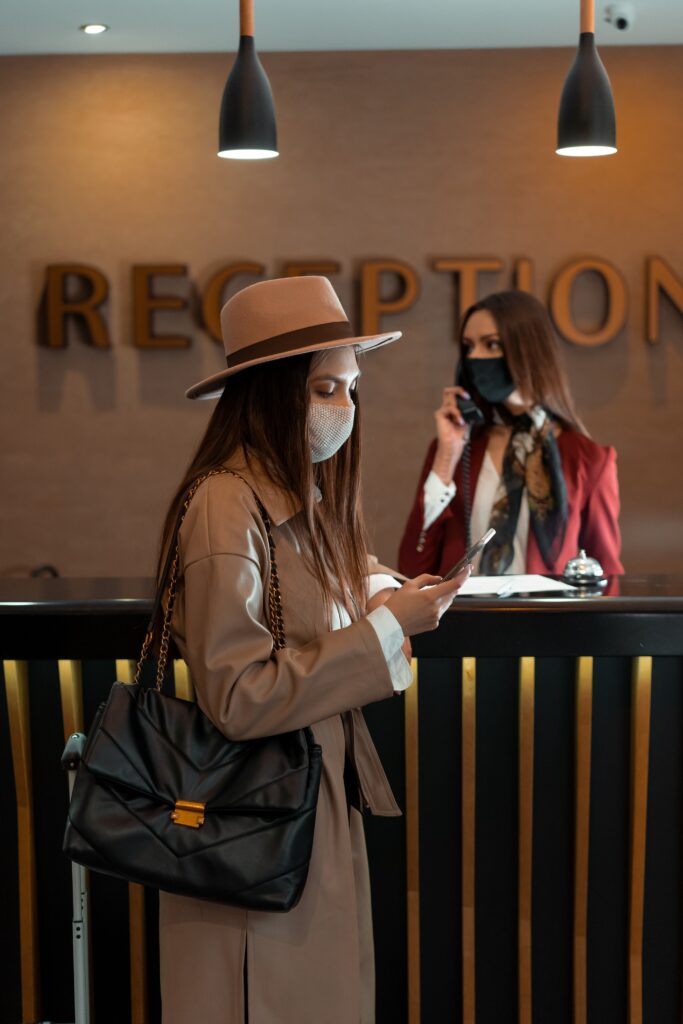What is the primary objective of customer service in the hospitality industry?
a) Maximizing profits
b) Creating memorable experiences
c) Reducing operating costs
d) Expanding the business globally
What does the term “anticipatory service” mean in the context of hospitality customer service?
a) Responding to customer complaints promptly
b) Identifying and meeting customer needs before they are expressed
c) Providing service only when requested by the customer
d) Offering personalized service to high-profile guests only
Which of the following is an example of active listening in customer service?
a) Interrupting the customer to provide quick solutions
b) Nodding occasionally while the customer speaks
c) Empathizing with the customer’s concerns and acknowledging them
d) Redirecting the conversation to a different topic
A guest asks for a restaurant recommendation, and you suggest one that is known for its vegetarian options because the guest mentioned being vegetarian. What customer service skill is demonstrated here?
a) Problem-solving
b) Upselling
c) Empathy
d) Proactivity
What is the best way to handle an irate customer in the hospitality industry?
a) Ignore their complaints and hope they calm down on their own
b) Apologize sincerely and offer solutions to resolve the issue
c) Argue with the customer to defend your position
d) Call security to remove the customer from the premises
What does the acronym “L.E.A.R.N” stand for in the context of customer service training?
a) Listen, Evaluate, Act, Respond, Nurture
b) Lead, Empower, Achieve, Respect, Nurture
c) Listen, Empathize, Apologize, Resolve, Notify
d) Leverage, Enhance, Acknowledge, Reward, Negotiate
Which communication channel is most suitable for addressing a customer’s complex issue or complaint?
a) Social media
b) Email
c) Phone call
d) Live chat
In the hospitality industry, what does the term “moments of truth” refer to?
a) Instances where employees take breaks during their shift
b) The critical points in a customer’s journey that significantly impact their perception of the service
c) Specific times of the day when customer traffic is highest
d) The moments when customers interact with other guests in the hotel
A guest complains about a malfunctioning air conditioner in their hotel room. What would be an appropriate response from the customer service representative?
a) “I’m sorry to hear that. Unfortunately, we cannot fix it until tomorrow.”
b) “Our air conditioning systems are quite old; you should expect some issues.”
c) “I apologize for the inconvenience. I will arrange for maintenance to fix it immediately.”
d) “I suggest you use the fan; it might help with the temperature.”
What does the term “going the extra mile” mean in the context of hospitality customer service?
a) Adding unnecessary expenses to the customer’s bill
b) Providing exceptional service that exceeds customer expectations
c) Offering discounts and promotions to loyal customers
d) Making customers wait longer to create anticipation for the service
Which customer service skill is essential for maintaining confidentiality and privacy in the hospitality industry?
a) Empathy
b) Active listening
c) Communication
d) Discretion
Why is consistency crucial in customer service delivery in the hospitality industry?
a) It helps establish strict rules for employees to follow.
b) It ensures that customers receive the same level of service every time.
c) It allows employees to experiment with different service approaches.
d) It reduces the need for ongoing employee training.
A hotel front desk clerk is handling a check-in for a VIP guest. What customer service principle should be prioritized in this situation?
a) Efficiency
b) Fairness
c) Equality
d) Exclusivity
What does the term “service recovery” mean in the hospitality industry?
a) Reimbursing customers for any inconvenience they may have experienced
b) Offering discounts and promotions to unhappy customers
c) Taking immediate action to resolve customer complaints and retain their loyalty
d) Ignoring customer complaints to avoid escalation
Which of the following is NOT a component of excellent phone etiquette in customer service?
a) Speaking clearly and with a pleasant tone
b) Asking probing personal questions to build rapport
c) Identifying oneself and the organization at the beginning of the call
d) Active listening to understand the customer’s needs
In the hospitality industry, what does the term “overbooking” mean?
a) Booking more customers than the hotel can accommodate
b) Offering free room upgrades to random guests
c) Arranging multiple events simultaneously in the hotel’s event spaces
d) Creating reservations for customers without their consent
What does the acronym “G.U.E.S.T” stand for in the context of providing excellent customer service?
a) Give, Understand, Exceed, Surprise, Thank
b) Greet, Understand, Empathize, Solve, Thank
c) Generate, Unite, Engage, Satisfy, Thank
d) Gather, Understand, Evaluate, Solve, Train
Which customer service skill is essential for handling cultural differences and diverse customer needs in the hospitality industry?
a) Multitasking
b) Patience
c) Empathy
d) Selling techniques
A customer service representative receives a complaint from a guest. What should be the first step in handling the complaint effectively?
a) Offer compensation immediately
b) Apologize and take responsibility
c) Inform the supervisor about the issue
d) Resolve the problem without further discussion
What is the purpose of conducting customer service training for hospitality staff?
a) To teach employees advanced technical skills
b) To emphasize the importance of hierarchy within the organization
c) To improve staff efficiency and effectiveness in handling customer interactions
d) To create a competitive environment among employees

